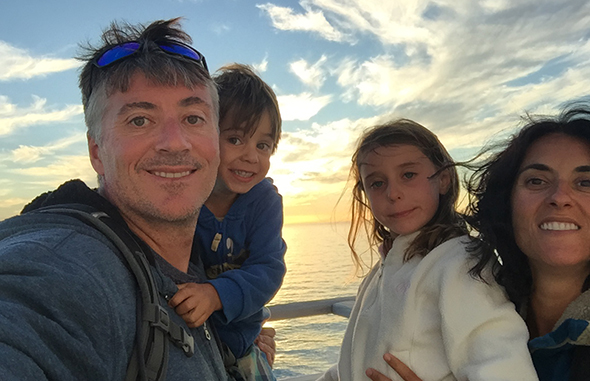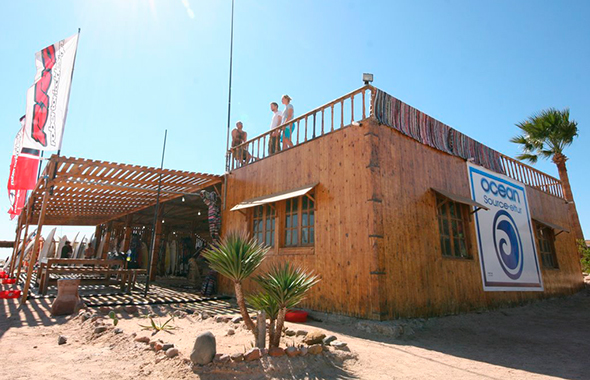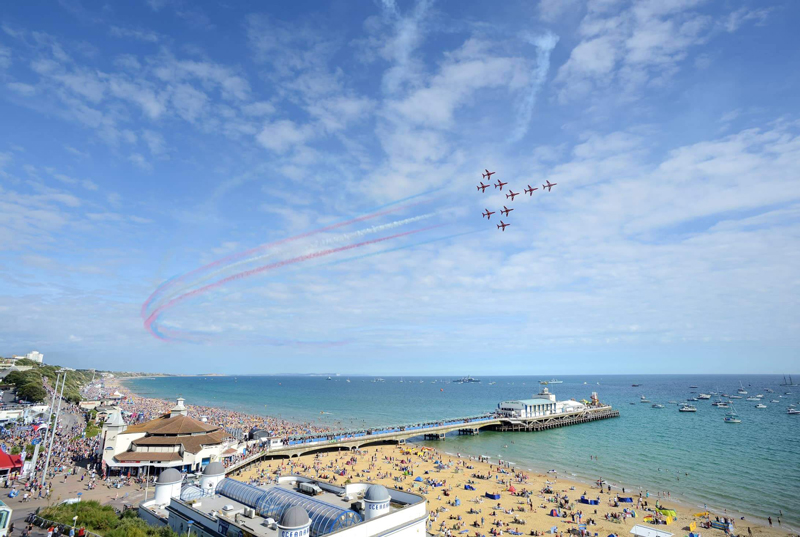Hello from Bournemouth!
By now you may have read The Wave at Hanging Rock, or The Things you Find in Rockpools – or maybe even progressed into that series. And it’s just possible that you might think I know what I’m doing as an author. That’s not entirely true, and even if it was, it certainly wasn’t always that way. So I thought I’d share with you the story of how I came to be an author. I hope it’s an inspirational tale. Before I go on I should say this is about a ten minute read, but if you’ve got a cup of coffee handy, I think you’ll find it interesting.
I haven’t properly introduced myself so far, so here’s a photo of me, together with my partner Maria and our two children Alba and Rafa. (Yes, I do know I’ve cut half of Maria’s face off, but it was the best shot I could find.)


And if you’re wondering why we used The Office, it was the only way to get dynamic action shots of the boards close up, where you could see the graphics, a bit like this one.


The Sinai desert isn’t the easiest place to set up a business ordinarily, and we picked a bad time. There were the growing political upheavals that would lead to the Arab Spring, there were terrorist bombings that made western tourists wary about visiting such a remote area. And the hotel where we were based was old and decaying fast in the hot desert sun, and located far from the main tourist hotspot, all of which meant the few people we could persuade to come out there, often didn’t much fancy coming back. However, I had some magical experiences: sailing among huge shoals of flying fish, paddleboarding with the dolphins that regularly came into our bay, and my favourite of all, getting know a culture and a people so different from Europe. But we couldn’t get enough people through the doors to make it work, and a couple of years later I ended up back home, still unemployed and now with a sizable debt to add to my unemployable problem.
My partner Maria comes from Seville, in the south of Spain, and I think at this point she was eyeing up a likely return home without me. I wanted to avoid this, so I agreed to get serious about life at last.
The question was how? In the end I sat down and worked through all the possible professions I could do, starting from A and going towards Z. I still wonder why – given how ‘author’ starts with ‘A’ – I didn’t decide this was my moment to give writing novels a serious go – I had nothing else on. But I guess I still wasn’t ready. Instead I got all the way to ‘P’ before I panicked that the alphabet was about to run out, and proudly proclaimed that I would become a Planning Officer. I wasn’t quite sure what this was, but it had a nice ring to it. So before I could realise just how incredibly unsuited I was to such a role, I took myself back off to university to get on with it. A year later I graduated with a masters degree in Town and Country Planning, and an even bigger debt.
But that wasn’t meant to be either. The UK Government had just begun its austerity program, and no one was hiring planners. However, the council in Bournemouth decided it needed someone to run a special project dreaming up ideas to bring shoppers back into the ailing town centre. I had no retail experience, I hate shopping, and I didn’t have any ideas, but they thought I was exactly who they were looking for. Who was I to argue?
So for a couple of years I toiled away at the council, working hard but not really making a difference. And still sensing that something wasn’t quite right. And then something truly tragic happened. Every year Bournemouth hosts a very large air show. It needs loads of people to make it happen, and anyone working for the council is ordered to get involved. I was given the task of sitting by a gate that led to the rear entrance of the airfield, and opening it for the pilots when they arrived. There was a combination lock on the gate, and all the pilots knew the code already, because they came every year and it never changed. But the health and safety officer insisted that someone not-very-important had to sit there. Well, when it came to being not-very-important, I was at the top of the list.
And as the pilots arrived (and opened the gate themselves) I couldn’t help noticing how they carried themselves. With the kind of loose ease that comes from doing something meaningful with their lives. I watched them stroll casually over to their aircraft. I saw them take off, and roar into the air and perform their incredible displays for hundreds of thousands of people. And I heard them interviewed over the loudspeaker system, about how they’d become pilots in the first place. How they were living the life they’d dreamed of.

And then, on the final afternoon of the festival, I sat by the gate as the Royal Air Force Aerobatic Team – the Red Arrows – came through.They do amazing things in bright red jets and they’re jaw-droppingly talented. One of the pilots who came through the gate that day was a man named Flight Lieutenant Jon Egging. I believe I remember him thanking me as I sat pointlessly by my gate. If so, it makes me one of the last people to see him alive.
After thrilling the crowd with their display, the Red Arrows performed one last fly-by, for the true aircraft enthusiasts who tend to gather at the airport itself. They swooped low over the runway in formation. But instead of all the jets pulling up as one, at the end of the pass, Jon’s plane veered left and kept low. Too low. Seconds later it crashed into some nearby fields and Jon was killed. I can clearly remember the mournful wail of the emergency sirens as I stood by my little gate wondering what had happened.
In the numbing hours after that accident something happened to me. I realised that if I really wanted to be a writer, then what I actually had to do was get on with it and start writing. Because life was short, and it could easily end up being even shorter than any of us imagine.
It took several years before I managed to write anything worth publishing. But this is already a very long email, so that will have to be a story for tomorrow. Or, you can click here, and read part two of this story.
In the meantime, please do take a moment to introduce yourself, it’s lovely to see where people are reading my books. You can email me at hello@greggdunnett.co.uk
Take care
Gregg
